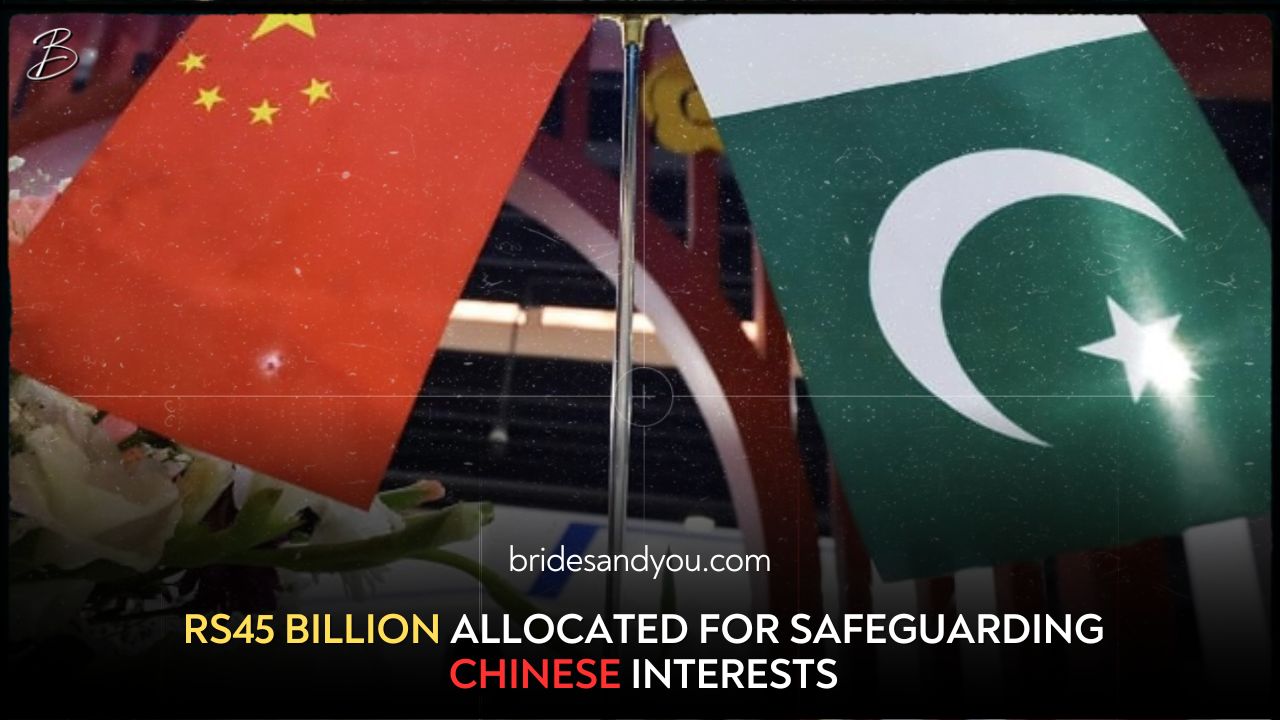Now Reading: RS45 BILLION ALLOCATED FOR SAFEGUARDING CHINESE INTERESTS
-
01
RS45 BILLION ALLOCATED FOR SAFEGUARDING CHINESE INTERESTS
RS45 BILLION ALLOCATED FOR SAFEGUARDING CHINESE INTERESTS

ISLAMABAD:
The government has approved an additional budget of Rs45 billion for the armed forces, primarily aimed at enhancing their capacity to protect Chinese commercial interests in Pakistan and to manage the fencing along international borders. The Economic Coordination Committee (ECC) of the Cabinet, chaired by Finance Minister Muhammad Aurangzeb, made this decision on Thursday.
Budget Allocation Breakdown
Out of the Rs45 billion, Rs35.4 billion has been allocated to the military, and Rs9.5 billion to the navy for various purposes. The funds will support ongoing defense projects during the current fiscal year, as highlighted in a proposal submitted by the Defence Division for a technical supplementary grant. This is the second significant supplementary grant for the armed forces since the budget approval in June, following a previous Rs60 billion allocation for Operation Azm-e-Istehkam.
The cumulative defense budget, including these supplementary grants, now exceeds Rs2.127 trillion.
CPEC Security and Border Management
A key portion of the supplementary grant—Rs16 billion—has been earmarked for the Special Security Division South, responsible for safeguarding the China-Pakistan Economic Corridor (CPEC) in the southern region. An additional Rs8 billion was allocated for the Special Security Division North, which protects CPEC in the northern areas. These divisions play a crucial role in securing Chinese investments and projects in Pakistan amid rising security concerns.
Due to an increase in terror attacks, China has expressed concerns about the safety of its nationals working on CPEC projects. As a result, China has urged Pakistan to sign an anti-terrorism cooperation agreement to address these issues. Additionally, China proposed the establishment of a joint security company to ensure the safety of its citizens involved in CPEC, especially during phase-II of the project.
Under CPEC phase-I, both countries have completed 38 projects, worth $25.2 billion, with 17 of these valued at $18 billion in the energy sector. Phase-II involves 26 more projects worth $26.8 billion, but progress has been slowed by ongoing security concerns. To bolster security, China has proposed including a mobile securing equipment project and ballistic protective vehicle initiatives in CPEC phase-II.
Additional Military Funding and Border Fencing
The ECC also approved Rs9.9 billion for the military’s internal security duty allowance and Rs1.5 billion for managing the ongoing fencing projects along international borders. The Navy received Rs9.5 billion for the development of Jinnah Naval Base in Ormara and Rs1.2 billion for the Naval Air Station in Turbat. Additionally, the Pakistan Air Force was granted Rs150 million for its internal security duty allowance.
Anti-Narcotics Force Salary Increase
The ECC considered and approved a proposal to increase the special allowance for Anti-Narcotics Force (ANF) employees. The increase will be equivalent to 20 daily allowances, aimed at aligning their compensation with other federal law enforcement agencies (LEAs). The salaries of ANF personnel were notably lower compared to other LEAs, despite their involvement in similarly dangerous work such as drug prevention and border patrol. The revised allowance will cost Rs264.7 million annually.
Anti-Rabies Vaccine Price Increase
The ECC also discussed the shortage of Anti-Rabies Vaccine (ARV) at the Federal General Hospital Chak Shahzad in Islamabad. The National Institute of Health (NIH) currently produces ARV at a cost of Rs891.7 per vial, significantly lower than the market price of Rs2,126.40 for WHO-approved ARV and Rs1,266.14 for non-WHO-approved ARV.
To address this discrepancy and ensure a sufficient supply of ARV, the ECC approved an increase in the retail price of NIH-manufactured ARV to Rs1,980 per vial. This price adjustment reflects the landed cost of imported materials and aims to maintain adequate production for public sector hospitals.
Climate Change Funding for COP29
In preparation for COP29, scheduled to take place in Baku, Azerbaijan from November 11 to 22, the ECC approved a Rs150 million supplementary grant. This grant will enable Pakistan to showcase its climate initiatives, including renewable energy projects, afforestation efforts, and disaster risk reduction measures, at the global event. As a country highly vulnerable to climate change, Pakistan will use the platform to highlight its domestic climate actions and achievements at COP29 by setting up a dedicated pavilion.













